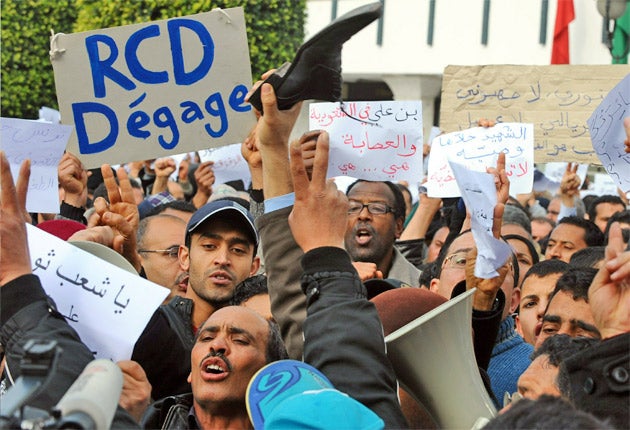Tunisian media throw off censor's shackles after decades of fear and collaboration

As protesters battle police on the streets, the media in Tunisia are undergoing their own revolution, with journalists taking over from the management and breaking the shackles of censorship.
The unfolding scenario, in the offices of the political parties and the streets, is being seen and heard by millions of Tunisians in newspapers and the broadcast networks. But reporters are well aware that people took direct action to remove a hated dictatorship not because of what the reporters had exposed, but in spite of the media's efforts to suppress it.
At the offices of La Presse and Essahafa, French and Arabic language newspapers in Tunis, staff have taken control and wanted directors to step aside. Souad Ben Slimane, a writer on cultural affairs, said: "It is essential that this takes place here as it is taking place elsewhere. We had let down our readers for many years, we had failed in our duty as journalists. How many important stories have been buried? How much truth has been replaced by lies? Look what happened to the story of Mohamed Bouazizi."
The account of how Mr Bouazizi, a young man of 26, burnt himself to death in protest at abuse by the state was viewed as too dangerous to touch by editors. The fact that it became public, and became the catalyst for anger which led to the overthrow of Zine el-Abidine Ben Ali was thanks to Facebook, Twitter and blogs outside the regime's control. Further ammunition came from hunting through US diplomatic cables made public by WikiLeaks charting the venality of the President, his wife, Leila Trabelsi, and the kleptocracy they headed.
The information was traded mostly among the young. Sahar Ben Younis, a 20-year-old student, said: "In the past we had to be really careful about saying anything about Ben Ali and his family on Facebook, but once people started writing about that poor man who killed himself and the demonstrations began, then we began to feel less afraid. But we only found out what was going on because of Facebook and Twitter. If we had to depend on newspapers and television, then we probably would never found out the details of that case and others."
The first press report of Mr Bouazizi's self-immolation was carried by the current affairs magazine Réalités, a little before Ben Ali's departure. The head of the publishing company, Taieb Zahar, said: "Even then there was a big debate about whether we should print it. This was not an easy matter for us. In our history of 33 years we have been suspended four times by the government for stories we had printed. This had led to financial losses and print losses, these are serious matters. But the final decision was mine and I decided to go ahead."
Prime Minister Mohammed Ghannouchi has promised "total press freedom" and has abolished the Ministry of Information. Mr Zahar insisted there could be no retreat as "people simply will not accept the old ways returning, they want the right to be informed." The first thing which will go from the magazine will be messages from President and Mrs Ben Ali in every issue. "We shall do something dramatic, we shall have news instead," he said.
But freedom of expression brings problems for journalists in Tunisia. Hamene Zhoiss, 30, a reporter on Réalités, said: "Most of us had not been taught in our journalism courses how to ask critical questions. In my course we were openly told that we could not write the facts in many cases. So, this is a challenge for us, our readers do not trust us, we have to now produce work to get that trust."
La Presse writer, Mouldi Mbarek, was regarded as a propagandist for the regime. "Yes we've made mistakes but it was not easy," he said. "This was not a free country and we were victims as well as being complicit. All I ask now is that we should stay united."
Join our commenting forum
Join thought-provoking conversations, follow other Independent readers and see their replies
Comments
Bookmark popover
Removed from bookmarks